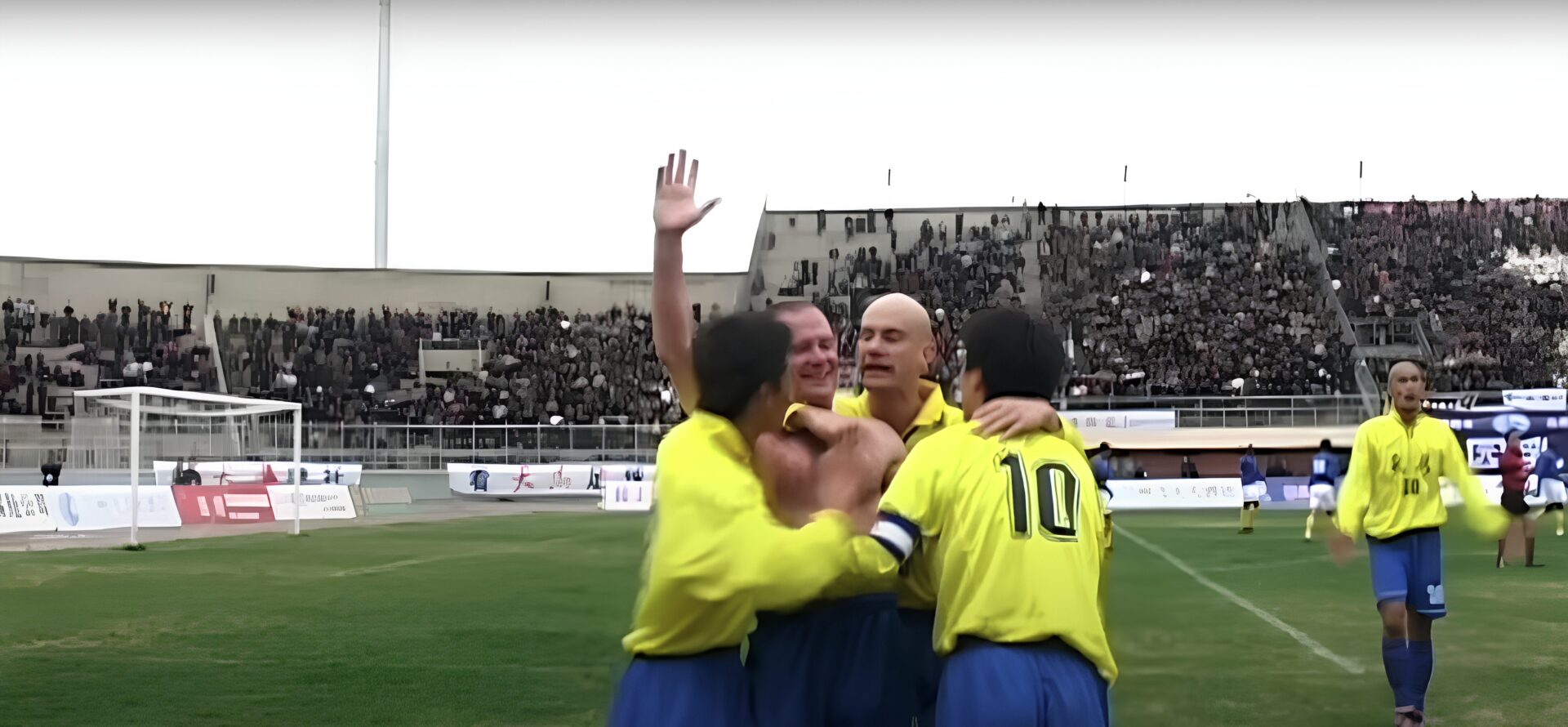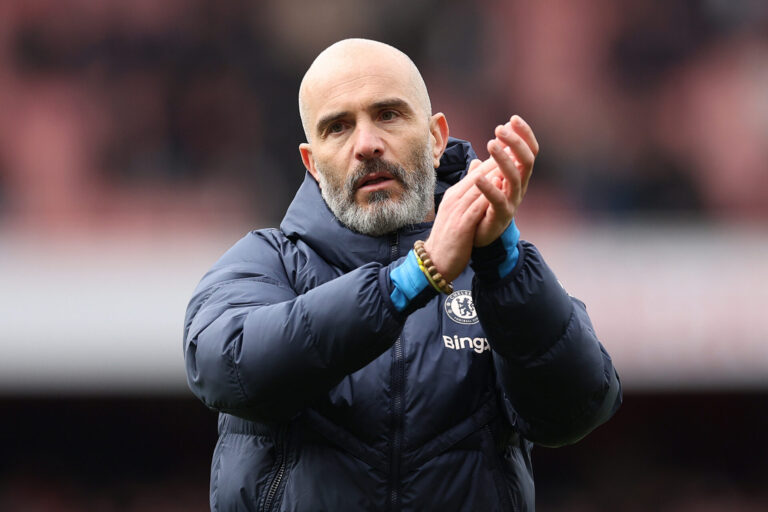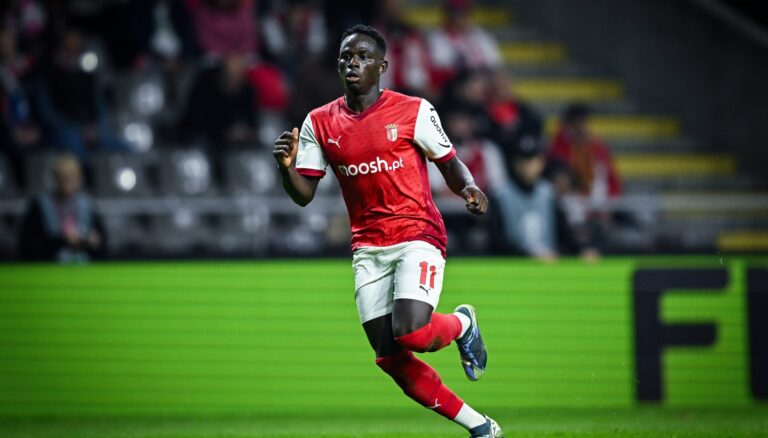Gazza Goes to Gansu: The Bizarre Story of Paul Gascoigne’s Chinese Adventure
Paul Gascoigne, one of England’s most enigmatic and gifted footballers, has always been a magnet for drama, controversy, KFC and the unexpected. His career, full of dizzying highs and painful lows, took many unpredictable turns. But few were more bizarre than his short-lived and surreal stint in the remote province of Gansu, China.
Yes, the same Gazza who lit up Italia ’90 with his tearful display of passion ended up playing in an obscure second-tier Chinese team called Gansu Tianma. It sounds like the punchline to a bad joke, but it happened, and like most things in Gascoigne’s career, it was a wild ride.
The Build-up to Gansu: A Career on the Decline
By the early 2000s, Paul Gascoigne’s career had drifted far from the European glamour he had once known. He had long left behind the glory days of Newcastle, Tottenham, Lazio, and Rangers. After leaving Burnley in 2002, Gazza’s professional career was clearly on the wane. At this stage, his body was ravaged by injuries, and his off-the-pitch struggles, particularly with alcohol, were well documented. Yet, Gascoigne’s allure remained potent enough that clubs from all corners of the globe were willing to take a gamble on his genius—however fleeting that genius might now be.
It was in this chaotic backdrop that he found himself accepting a bizarre offer from China in 2003 after rejecting a move to D.C United in the MLS. Gansu Tianma, a club that most football fans in Europe hadn’t heard of, had ambitious plans to raise their profile. Signing a player of Gascoigne’s stature, albeit past his prime, seemed like a brilliant marketing coup for the club based in one of China’s most remote and least developed regions.
The Gansu Tianma Adventure Begins
When you picture football in China, today’s glitzy Super League might come to mind, with big-name stars like Oscar and Hulk lured by massive wages. But in 2003, Chinese football was in a very different place. Initially, Paul Gascoigne failed to impress after training with first-division side Liaoning Bodao and was not offered a contract, but that didn’t end Gazza’s spell in China.
Gansu Tianma were competing in the second tier of Chinese football and didn’t have the resources or infrastructure of modern clubs. The idea of a fading European superstar playing in Gansu seemed as strange then as it does now.
The deal to bring Gascoigne to Gansu was reportedly worth around €600,000 for a one-year contract, which at the time was a pretty massive amount of money. It might not have been the millions that other foreign stars were earning at the time, but for a player battling personal demons and looking for a fresh start, it must have seemed like a decent offer. Gascoigne even took on the of a player-coach, imagining himself as the leader who could transform the club.
Gansu Tianma general manager Zhong Bohong said at the time
“We picked him because he’s a real professional football player. We noticed he has two shortcomings – one is his physical fitness, another is leg strength. He has a good sense of the game. He has good skills and experience, especially in the big matches. We think he could play a key role in the team. We’d like him to be the spiritual leader of the team”
But reality hit as soon as Gazza touched down in China.
Culture Shock and Struggles
China was a far cry from the places Gazza had previously played. Gansu, a province known for its arid climate and mountainous terrain, didn’t offer the comforts or nightlife of Newcastle, Rome, or London. Before going over Gascoigne was told by a reporter that
“Lanzhou is officially the most polluted city on earth… its summers are cursed by the choking dust of the Gobi desert, its winters are buffeted by freezing blasts from outer Mongolia.”
The language barrier was immense, and Gascoigne’s reputation had preceded him—both as a footballing genius and as a man prone to erratic behaviour. The local press was curious but cautious, and expectations were tempered. On his debut, Gazza did what Gazza does, scoring after 14 minutes with his left foot outside the box. He scored against Qingdao Hailifeng in the Chinese Jia B-League in 2003. He played for 85 minutes in the 2-0 win, that was probably the peak of his career in China.
From the start, it became clear that this wasn’t going to be the fairytale resurrection some had hoped for. Gascoigne struggled to adapt to the lifestyle in Gansu. Local reports from the time suggest that his fitness was a major concern. His body was far from the peak physical condition that had once wowed fans, and the rigorous demands of professional football were becoming increasingly difficult to meet.
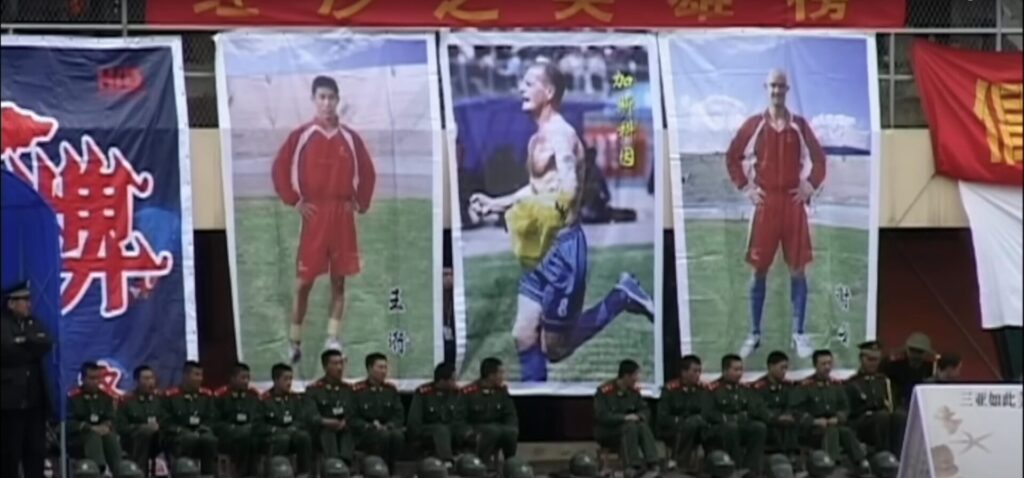
“I’ve just got to hang in. Believe me, it is hard, but I just have to hang in with the air, with the breathing. Sleeping at night is sometimes really difficult for us, but I’ve had to get used to that as well. Imagine, in two hours’ time, how hot it’s going to be—there’s no air. And then also in the stadium, all the supporters, there’s no oxygen whatsoever.”
The matches themselves were played in modest stadiums, far removed from the grandeur of his previous haunts. Gazza’s Chinese teammates were no doubt in awe of his talent, but they were also bemused by his erratic behaviour. There were whispers of disagreements with the coaching staff, training sessions missed, and overall confusion about his role in the team.
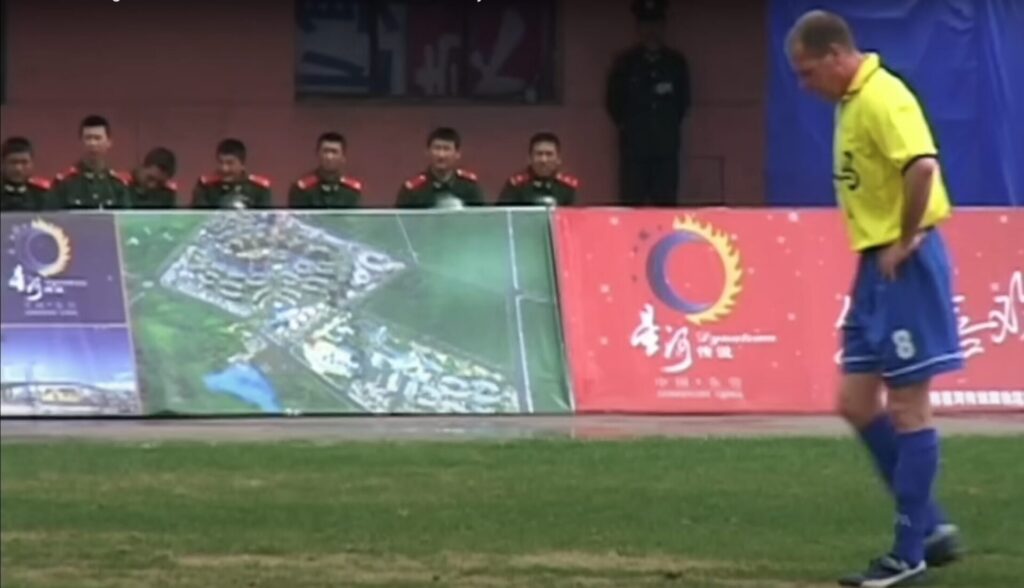
The Beginning of the End
The final nail in the coffin came just a few weeks into his Chinese adventure. Gascoigne’s physical and mental state took a dramatic turn for the worse. According to some reports, his drinking problems resurfaced, and he found himself unable to cope with the isolation and the lack of familiar surroundings. It was rumoured that after only a couple of appearances for Gansu Tianma, Gascoigne abruptly left China, unable to adjust to the realities of life there. It was the stress of having to coach a struggling team, alongside being alienated, alone and in a different culture where everyone was trying to sell him knock-off Rolexes.
There were conflicting reports about what exactly triggered his departure. Before his spell ended, there were reports that Gascoigne and his teammates had not been paid for two months. Some said it was the physical demands of the game, while others suggested that his personal struggles, including his battle with alcoholism, had simply overwhelmed him. When Paul Gascoigne was bored, he used alcohol as a form of escapism, like many addicts. He would regularly be found in his hotel’s bar playing pranks on the hotel staff.
“When I’m drinking, I forget about everyone and don’t realise the hurt I’m doing to everyone but I’ve also got to think about the hurt I was doing to myself. “
Whatever the reasons, his Chinese adventure ended almost as quickly as it began. Gazza left Gansu Tianma in September 2003, after just 4 appearances, having scored two goals and contributed little on the pitch.
Gascoigne’s side of the story is that he left after being owed £80,000 in wages, he was set for a 5-week break from Chinese football, and his friends were all leaving him, heading back to England. He was homesick. Or at least that was his side of the story.

The truth is probably somewhere in between.
Legacy of a Strange Episode
In hindsight, Gascoigne’s time at Gansu Tianma has become more of a curious footnote in his storied and chaotic career. It’s the kind of thing that feels more like a fever dream than a real event, but it offers an insight into the disarray that had become part of his life by this stage. While some footballers transition into the twilight of their careers with grace, moving to lesser leagues for a final payday or to pass on their knowledge, Gascoigne’s chaotic persona meant that even his late-career moves were riddled with drama.
His time in China also highlighted the growing globalisation of football. Even a remote club in Gansu was able to land a player of Gazza’s calibre, albeit for a fleeting and ultimately unsuccessful stint. In some ways, Gascoigne was a pioneer, making the sort of move that would later become more common as leagues in China, the Middle East, and North America began offering retirement homes for ageing stars.
For Gazza, however, Gansu was not the stage for a triumphant final act. It was more of an epilogue to a career that had already written its most thrilling chapters, two or three chapters ago.
Conclusion: A Forgotten Chapter in a Wild Career
Paul Gascoigne’s brief and bizarre time at Gansu Tianma is one of those footballing stories that seems almost too strange to be true. It was a misfit pairing from the start—an English maverick in a remote corner of China, searching for a new beginning that never quite materialised. While his time there didn’t leave any lasting impact on Chinese football or his own legacy, it remains a testament to the unpredictable and often tumultuous life that Gascoigne led.
His stint in Gansu is another reminder of the fragility of footballing careers, especially for those whose talent is matched by personal demons. Gazza’s trip to Gansu may not have lasted long, but like so many chapters of his life, it left a story that we’ll never forget.
If you want to see more about Gazza’s time, watch the full documentary here.


